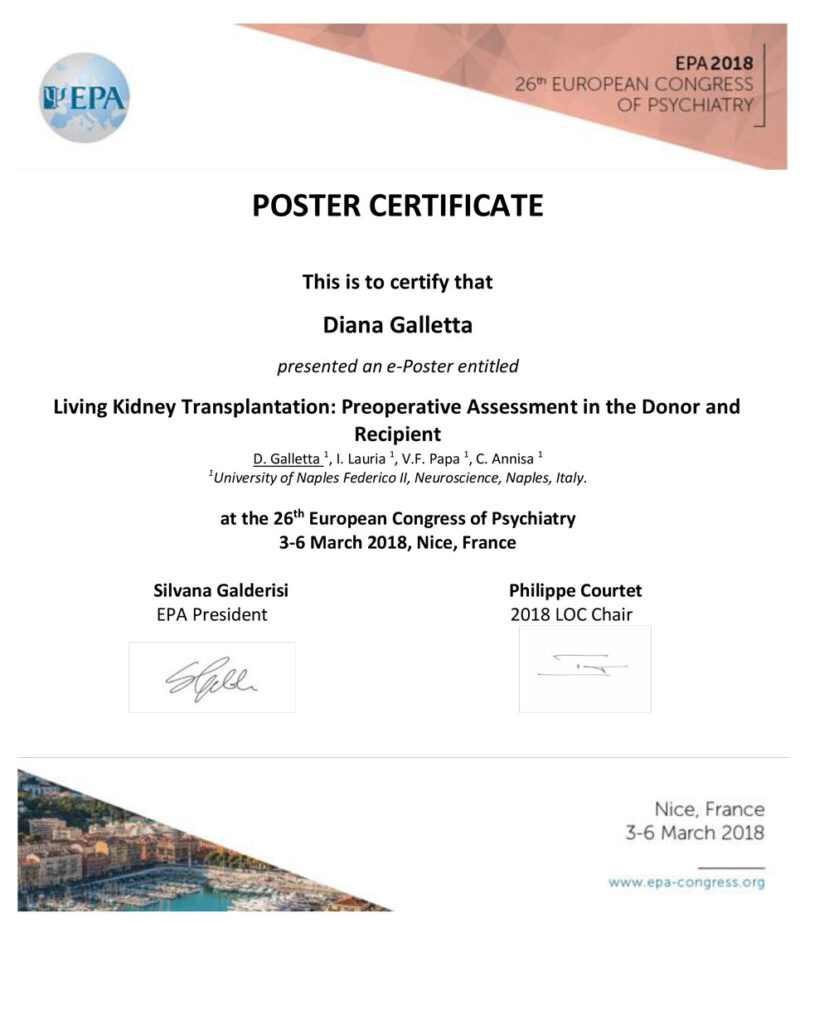Galletta D., Lauria I., & Cotena A.
http://www.epa-congress.org/2018/programme-submission/abstract-book-2018#.WqEJi2ah0dU
Introduction. The kidney transplantation isn’t only medical process but it also influences the patient’s body image, with difficult to accept a new part of itself (Karaminia et al.).It’s complex both for the receiving and the donor, because it’s psychological, emotional, relational and social implications, as shown in literature (Galletta et al.). It’s just analysed with multidisciplinary approach with a couple of brothers, inserting other tools in the assessment (Galletta et al).
Objective. To demonstrate the importance of the assessment of psychological profile for the evaluation of the being ready to take on the operation.
Methods. It’s evaluated another pair of brothers, using the following tests: SCL-90-R, IRI, graphics test, Raven’s Progressive Matrices and Rorschach test.
Results. In the donor there’s a search of security in the past, tendency to coarctation and defensive attitude. He has a strong self but difficulties to act in the future, showing anxiety, stress and difficult to manage. He has ambivalent personality, tending to insourcing, intellectualize and tending to continuous comparison with himself, sometimes extensive and tending to lift out (FM 4; kF 1; Fc 1; cF 1; C’F 1 + 2add; CF 3 + 1add). The subject is aware of the situation in question, that’s operation and its complexity, showing a certain discomfort, as said before.
The receiving’s an immature self (M/FM=2/8) and fragile (4F including 3F minus), reticent and coarse, denying affectionate and dependence needs (absence of Fc) exposing traits of obsessive-compulsive behaviour, negative mood and traits of anxiety. He tends to excessive adherence to reality, blockage in affections, defensive attitude seeking security in the past. Compared to donor, he seems to have the capacity to manage the difficulty. There are conflicts and problems in parental relationships. However, he presents the awareness and acceptance about the condition and the treatment, no showing discomfort, compared to donor.
Discussions and Conclusions. Living donor kidney transplantation didn’t affect the lives of donors and improved many aspects of the lives of recipients (Pascazio et al.). However, psychological and social aspects may be impaired by living donation (Haz et al.). Therefore, it’s important an appropriate multidisciplinary approach, knowing the psychological status of both patients.
Bibliography
1.Galletta D., Lauria I., Longobardi T., et al. The Complexity of Life Donor Renal Transplantation: The Role and Effectiveness of Multidisciplinary Approach in the Medical Route and Psychological Operation (2016). Journal of Clinical Research & Bioethics: 7, 1-5.
2.Galletta D., Mastrola A. M., Suarato V. (2015). Living renal transplant donors: psychiatric and psychological evaluation in pre-transplant assessment. UNESCO Chair in Bioethics 11th World Conference Bioethics, Medical Ethics and Health Law – “Living renal transplant donors: psychiatric and psychological evaluation in pretransplant assessment”. Naples, Italy.
3.Haz I., Naqvi A., Hasan Rizvi A., et al. Psychosocial aspects of dialysis and renal transplantation. 1-5.
4.Karaminia R., Tavallaii S. A., Lorgard-Dezfuli-Nejad M., et al. Anxiety and Depression: A Comparison Between Renal Transplant recipient and Hemodialysis Patients (2007). Transplantation Proceeding: 33, 1082-84.
5.Pascazio L. Nardone I. B., Clarici A., et al. Anxity, Depression and Emotional Profile in Renal Transplant Recipient and Healty Subjects: A Comparative Study (2010). Transplantation Proceeding: 42, 3586-90.


